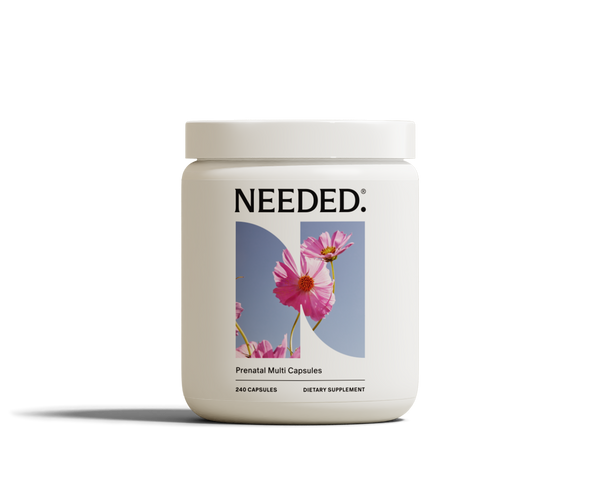Postpartum Bloating and Digestion Changes
Postpartum bloating is a very common part of recovery caused by a variety of hormonal and physical changes after birth. Changes in postpartum digestion, such as slower bowel movements, trapped gas, and abdominal heaviness, all contribute to bloating. While these issues are usually temporary, they can cause serious discomfort during the early weeks of recovery.
These digestive symptoms often happen because hormone levels drop sharply after delivery, slowing the digestive system. Additionally, stress, lack of sleep, and changes in the gut microbiome can also be contributing factors.
While you wait for things to level out, adopting some daily habits, such as staying hydrated, eating fiber-rich foods, and engaging in gentle movement, can ease your recovery.
What Is Postpartum Bloating?
Postpartum bloating refers to the accumulation of gas and abdominal pressure that occurs after childbirth. Physical postnatal changes can cause your stomach to feel swollen or heavy, and may make passing gas more difficult.
Symptoms
Common symptoms include:
- Feeling gassy or uncomfortably full
- A visibly swollen or tight belly
- Cramping or abdominal pressure
- Trouble passing stool or gas
- Ongoing postpartum stomach bloating that feels worse after meals
Although uncomfortable, postpartum bloating is usually temporary and improves over time.
Common Causes of Postpartum Bloating
Hormonal changes after birth
After delivery, estrogen and progesterone levels drop sharply. When that happens, it impacts something called “gastrointestinal motility,” which is basically how food moves through your intestinal tract. Essentially, hormones disrupt your gut’s natural rhythm, making it harder to regulate gas and leaving you feeling bloated.
Constipation and slower digestion
Postpartum constipation is one of the most common drivers of bloating. Some common causes are iron supplements, dehydration, or a fear of straining due to perineal lacerations.
Recovery from C-section or vaginal birth
During recovery from a C-section, you’re often limited in movement, which can also slow digestion and cause a bloated feeling. Vaginal births can also affect digestion if pelvic floor strain makes bowel movements harder.
Medications and pain relief
Certain painkillers and antibiotics may disrupt your gut balance, leading to postpartum bloating or other gastrointestinal issues.
Changing Gut Microbiome
Pregnancy alters your gut bacteria, and it can take some time for things to return to normal. While things are still adjusting, you may notice a change in overall gut health, such as unpredictable or sluggish digestion.
Stress and lack of sleep
Stress and sleep disruptions are common as you adjust to a new baby, but they can also impact your gut health. Stress hormones, such as cortisol, can interfere with bowel movements, while fatigue slows down the digestive process. Together, they often contribute to digestive issues like bloating and constipation.
Postpartum Digestion Changes Beyond Bloating
Along with bloating, many parents experience other digestive issues as their bodies recover from pregnancy and delivery. As with bloating, these tend to subside naturally with time and patience, but they can still cause a lot of discomfort.
Constipation and irregular bowel movements
A common digestive issue that pregnant and postpartum women deal with is constipation and irregularity. Usually harmless, there are a number of potential causes:
- Iron supplements
- Dehydration
- Pelvic floor weakness
- Fear of straining after birth
Physiological changes also play a role: intestinal slowing (ileus) may be triggered by:
- Pain and trauma from delivery
- The release of a hormone called relaxin, which relaxes the smooth muscles of the digestive system, slows the movement of food through the gastrointestinal tract.
- Uncomfortable or painful hemorrhoids
Postpartum constipation typically improves within weeks, especially with adequate hydration, gentle exercise, and dietary adjustments.
Gas and abdominal discomfort
Trapped gas and painful cramping are a normal part of recovery. These symptoms often result from slowed digestion, a weakened abdominal wall, or changes in gut motility. As with constipation, most mothers start to feel normal within a few weeks as the bowel rhythm normalizes.
Diarrhea and antibiotic impact
Antibiotics, as a result of a C-section or a post-birth complication, may trigger temporary diarrhea, nausea, or thrush because they alter your gut microbiome. Most side effects resolve quickly; however, always consult your healthcare team if you experience persistent and/or severe diarrhea.
Relief Strategies for Postpartum Bloating and Digestion Issues
Wondering how to relieve postpartum bloating? Along with just waiting it out, small, practical steps can make a big difference in easing discomfort, supporting your recovery, and helping your body feel more balanced.
Below are gentle and straightforward strategies you can try at home, many of which are safe for use while breastfeeding and can be easily incorporated into your everyday life.
Hydration and fiber-rich foods
Staying hydrated and eating enough fiber are two of the most effective ways to keep your digestion moving smoothly. You don’t have to go on a special diet; incorporate a few of the following:
- Drink at least 6–8 glasses of water daily to keep stools soft.
- Include chia or flaxseed, and fiber-rich fruits, vegetables, and whole grains.
- Up your Omega-3 intake, which has been shown to have positive effects on gut health
- Limit processed foods, as they can exacerbate bloating.
Gentle movement and activity
Light movement helps stimulate the digestive system and ease trapped gas without putting strain on your healing body.
- Slower walking can stimulate gut motility.
- Try gentle yoga or stretching to relieve trapped gas.
- Use deep breathing exercises to relax abdominal tension.
Ensure you obtain clearance from your provider and avoid any heavy lifting or high-impact workouts for as long as your provider recommends.
Probiotics and fermented foods
You’d be surprised just how much our overall gut influences our overall health, so a gut-friendly diet can improve digestion and have positive long-term effects.
- Add probiotic-rich foods such as yogurt, kefir, sauerkraut, or kimchi.
- Include prebiotic foods (bananas, oats, garlic) to feed healthy bacteria.
- Consider a postpartum-friendly probiotic supplement if recommended by your healthcare provider.
If you’re adding more fermented foods to your diet, track how you feel after eating, as some fermented foods may cause more gas.
Make simple dietary changes
Small, intentional changes in eating habits can make a big difference in reducing postpartum bloating:
- Eat smaller, more frequent meals to avoid overwhelming your digestive system.
- Chew your food slowly to reduce the amount of air you swallow.
- Limit gassy foods, such as beans, cabbage, and fizzy drinks, if symptoms worsen.
- Avoid chewing gum or drinking through straws, which can increase bloating.
When to See a Doctor About Postpartum Bloating
Sometimes, lifestyle changes aren’t enough, so if you’re bloating or having GI issues that persist past the first few weeks postpartum or worsen, make an appointment with your provider. Seek medical advice if you experience:
- Severe or persistent abdominal pain that doesn’t improve
- Inability to pass stool or gas for several days
- Blood in your stool or black, tarry stools
- Bloating and discomfort that lasts for months without improvement
- Ongoing nausea, vomiting, or unexplained weight loss
These symptoms can indicate a more significant digestive issue that may require professional support to resolve.
Frequently Asked Questions
Is postpartum bloating normal?
Yes, postpartum bloating is really common and most of the time is simply part of your body’s natural recovery process. It can be caused by a number of different things: hormonal changes, slower digestion, and the healing period after birth can all contribute to postpartum digestive issues.
How long does postpartum bloating usually last?
Postpartum bloating typically improves after a couple of weeks, but it may take several months for your digestion to return to normal. If you still experience symptoms after a few months, it may be worth consulting with your healthcare provider for advice.
Why do I feel more bloated after a C-section?
You may experience more bloating after a C-section because of a combination of things that slow down digestion, like anesthesia, pain medication, and reduced mobility. This can lead to trapped gas and a heavier feeling in your stomach.
What helps with postpartum constipation?
Eating a high-fiber diet, increasing fluid intake, and engaging in gentle movement, such as walking, can often help ease postpartum abdominal discomfort caused by constipation. If necessary, yor doctor may prescribe a mild laxative or stool softener.
Does breastfeeding cause bloating or gas?
Breastfeeding doesn’t directly cause bloating or gas. Some hormonal changes, like the presence of relaxin, a hormone that relaxes the ligaments and muscles, can impact digestion and how quickly food moves through the gut.
Can gut health affect my recovery after birth?
Your postpartum microbiome plays a crucial role in digestion, immunity, and overall recovery. Keeping an eye on your gut health and doing everything you can to keep things moving along can have a positive impact on your postpartum recovery
















